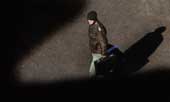 |
| For some people, the fear of the number 13 is so great, that they constantly live under its shadow. |
It?s really strange that Hitler managed to get away with all those atrocities and great armies buckled under the attack of Napoleon. One didn?t even perhaps need major strategies or armies running into thousands to deal with them.
Maybe just a 13-member army or attacking them on the 13th day of the month would have done the trick. Chances are these leaders wouldn?t even have dared fight back. Just a simple number ?13 ?would have managed what huge strategies couldn?t.
Both these leaders suffered from this fear of number 13, in scientific terms called Triskaidekaphobia, an irrational, morbid fear, as some would call it, but very real and tormenting for those who are victims of it.
And Hitler and Napoleon are not the only ones who suffered from this fear. They are just two in a long list of famous personalities which includes Herbert Hoover, Mark Twain, Richard Wagner, Franklin Roosevelt, Stephen King, Victor Hugo, Arnold Schoenberg, among many more.
Admitted these are names of far off people, from far off places and maybe far too successful for us to relate to. But there is also the next door neighbour, who never travels on the 13th as he thinks misfortune will follow, an old maternal aunt who chides no end if someone in the family cuts nails on a Friday, as inevitably it brings sorrow, an otherwise modern grandma who suddenly turns finicky if bedsheets are changed on a Friday, as they will bring bad dreams.
And no matter how hard one argues that the clean sheets, no matter what the day, can only bring sweet sleep, will fall on deaf ears. And the poor grandma is hardly to be blamed. Not after one has just heard of all the great figures who panicked no less, if not more, at the association of things or events related to 13 and Friday, a fear all the more confounded when both club together, which again to put scientifically, is known as Paraskavedekatriaphobia.
So, the fear, or as some would insist, this superstition, has a scientific name, but is there is scientific basis to this phenomenon, under the spell of which even president Roosevelt, insisted on tagging his secretary along to a party if he happened to find out that there would be 13 guests present?
While sceptics would laugh it away, believers have a long list of anecdotes to justify their fears, well backed by biblical and other historical events and lores to trace its history.
To look at the positive aspect first, it has not really been considered an evil or inauspicious number everywhere, or always.
In ancient Egypt and China, it has even been looked upon as a lucky number. To ancient Egyptians, life was a quest for spiritual growth and fulfilment, which unfolded in stages, 12 in this life and a 13th beyond, which was thought to be eternal afterlife. To them, 13 symbolised death, but not in terms of dust and decay, but as a glorious transformation to a higher stage.
Though, at later stages, the death symbol did perhaps get corrupted into something to be feared.
In most civilisations, the fear goes back to lores centuries old, though studies show that it?s actually more in modern times the fear has taken a more fearful force. Though in many pre-Christian cultures, Friday was the day of Sabbath and worship, with the growth of Christianity, the fears against it found support. It was on a Friday that Eve tempted Adam with the apple that led to the loss of paradise and eternal suffering for mankind.
At the Last Supper, Judas, the disciple who betrayed Christ, was the 13th to sit at the table. And Friday was the day of crucifixion, as well as the great floods and the destruction of the temple of Solomon.
For sceptics wondering about the existence of calenders, and of what kinds, at that time, there are more lores which believers of the fear narrate. It is also related to Loki, the Norse God of evil, who started a riot when he crashed a banquet at Valhalla attended by 12 gods.
There are also those who say, 13 is simply considered a bad number because it is one more than 12, which is a popularly used number in many cultures.
?Everything associated with 12 is considered good because 12 is a complete number and as 13 falls just after completeness, it gets associated with everything bad, that is why people fear it,? says Ashok Patnaik, a psychiatrist with Tata Motors hospital.
To popular beliefs and lores, there?s no end. Surprising aspect is that it?s a fear that?s actually grown, and is as widespread, in fact more so, as studies have shown, in countries like the United States, as in countries, which are supposedly more superstitious prone like India.
In the United States, there has never been a F-13 fighter aircraft, and the Nazi fighter plane developed from the He-112 was designated He-100, to avoid the designation He-113.
On the other hand, interestingly, witches, perhaps to clearly oppose themselves to a Christian superstition, sometimes have groups of 13 known as covens. They remain, however, rare exceptions. But situation remains that just try doing something associated with 13, and guaranteed chances are an aunt or a grandma or a neighbour will be ready to pounce with panic about the impending doom.
But as one knows, millions of people associate themselves with 13, with nothing ever happening. It?s a fear easy to get rid of. ?He can himself resolve all fears. What is required is a total regain of control over one?s emotions to conquer the phobia,? says Patnaik.
Saswati Mukherjee










